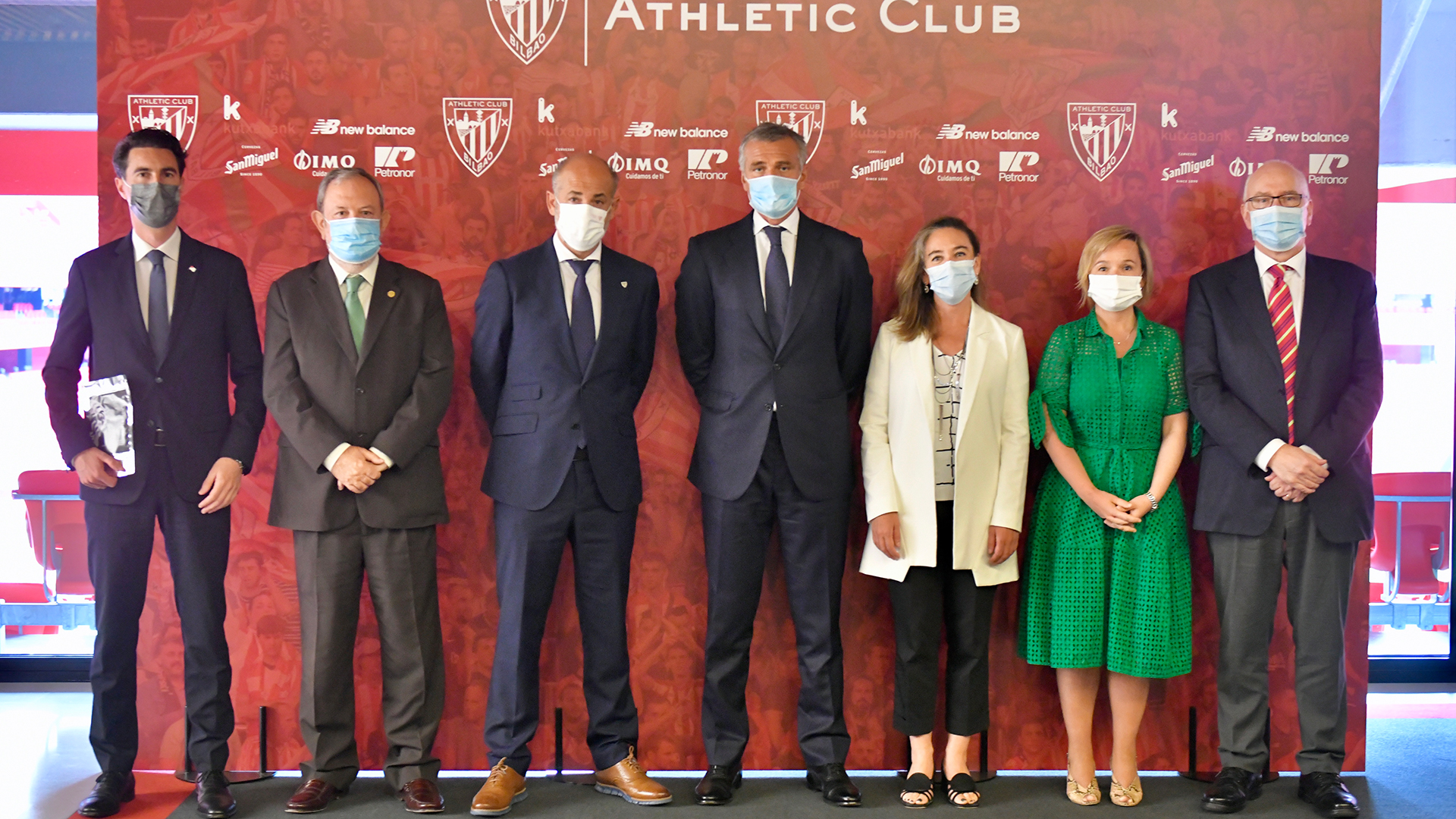
Athletic Club’s socio-economic impact report presented
Athletic Club’s socio-economic impact report presented
Last year, the entity generated an economic activity of more than 465 million in Biscay, with 2,821 jobs and 103 million in tax revenue
Athletic Club president, Aitor Elizegi, and Gonzalo Sánchez, president of the PwC (PriceWaterhouseCoopers) Spain consultancy and former club executive, presented a report on the socio-economic impact of Athletic Club in the North Hall of the San Mamés ring. The event was attended by institutional representatives from the Basque Government, Bilbao City Council and the Bizkaia Provincial Council, club sponsors, managers from the main media and representatives from the Board of Directors.
Taking the 2018/19 season as a reference, the report analyses and highlights the social and economic impact of Athletic Club and its Foundation. In the analysis, it distinguishes the impact generated in three territories: Bizkaia, Hegoalde and the State as a whole. In the first introductory part, the report highlights Athletic Club’s unique and differential management model, which makes the club a real driving force in the economic and social development of the Basque Country.
The economic impact is divided into three different areas: economic activity, employment and fiscal impact. In terms of production, Athletic Club generated economic activity in Bizkaia of close to 466 million euros, in Hegoalde of 570 million euros and in Spain as a whole of more than 750 million euros. All of this causes a multiplier effect which means that for every euro generated directly by the club’s activity, 2.3 euros of production are reached in Bizkaia; 2.8 euros in Hegoalde; and 3.7 euros at the State as a whole. The report also highlights the driving force of the Club, which is over 206 million euros.
An important part of this impact in Bizkaia (43 M Euros) is led by the red-and-white supporters that regularly attend San Mamés and Lezama. As far as employment is concerned, Athletic contributes to generating more than 2,800 jobs in Bizkaia, more than 3,700 in Hegoalde and nearly 5,500 in the State. Once again, the multiplier effect makes it possible for each person employed by the club to create 6.2 jobs in Bizkaia, 8 in Hegoalde and 11.9 in the State. Finally, the report highlights the contribution via concerted taxes and local taxes. More than 115 million euros.
The social impact takes as a starting point the unique sports philosophy of the Club, its commitment to the development and comprehensive training of junior players, counting on the unconditional support of members, supporters and fans. Thus, 45.33% of all licences for men’s football and 39.6% for women’s football in the Basque Country are the result of agreements established by the Club. The report specifies the way in which Athletic Club tries to provide the partner clubs with the best possible human, material, methodological and medical resources. Likewise, the sense of belonging that Athletic shares with its supporters is shown by the outstanding number of members (44,560) and clubs (465). The report also highlights the club’s commitment to gender equality, the promotion of women’s football and the presence of women in governing bodies.
Furthermore, the significance of the stadium, which is highly praised globally for its infrastructure, should be outlined. During this period, San Mamés hosted 142 sporting, social, commercial and professional events, attracting 130,000 people. The most outstanding was the European Music Awards (MTV), with 35,000 spectators, and the Bilbao Rugby Finals (85,000).
In addition, the report also highlights the work carried out by the Foundation, Athletic Club Fundazioa, with an impact on more than 74,500 people. Most of these projects are aimed at groups at risk of social exclusion, with which the Foundation works in collaboration with numerous organisations and institutions. The Foundation’s contribution to society in the cultural field and in the promotion of the Basque language is also highlighted, as well as the club’s and Foundation’s commitment to sustainable development, as evidenced by the first LEED certification, the fleet of electric cars and the compensation of CO2 through reforestation.
